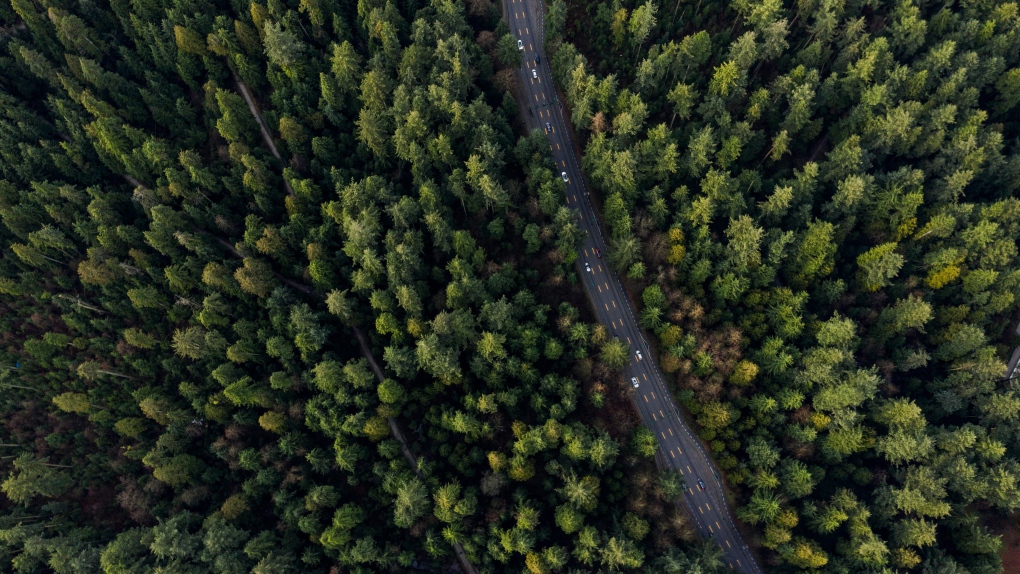How police are using advanced technology to search for missing persons in Canada
 A British Columbia highway is seen from the air in a photo from Shutterstock.com
A British Columbia highway is seen from the air in a photo from Shutterstock.com
Advanced technology will be used in the search for missing persons across Canada, including along the West Coast, the RCMP announced last week.
The initiative involves "advancements in satellite and hyperspectral imaging technologies," the RCMP's National Centre for Missing Persons and Unidentified Remains said in a statement Thursday.
This technology is being used to detect locations where human remains may have been discarded, partially buried or hidden in shallow graves.
The rollout began last Monday, and the first locations to be searched were in British Columbia.
Mounties would not provide specifics of the locations, but said first plane left from Calgary and flew over targeted areas in the province.
The RCMP told CTV News that specific details would not be provided for now to preserve the investigation and "operational intelligence."
The single-engine plane was equipped with hyperspectral imaging technology, which collects and processes information from reflected sunlight.
While human eyes mostly see light in three bands – perceived as red, green and blue – hyperspectral imaging is able to "see" many more of these bands, generating a lot more data than the eye alone.
According to the RCMP, "certain objects leave unique 'fingerprints' in the electromagnetic spectrum."
These objects include characteristics of decomposing bodies, including gases. Hyperspectral imaging can make these characteristics stand out.
"These technologies have the potential to offer new opportunities for law enforcement to use organized, systemic and non-invasive approaches to cover mass stretches of land and gain visual acuity of key areas of interest," RCMP Sgt. Caroline Duval said in an email Friday.
"Some of these search areas lie over large, inhospitable terrain. Searching by air allows us to locate potential areas of interest without disrupting forensic evidence."
Duval didn't provide details on which cases the technology may be used to investigate, but said areas selected for search will be based on specific investigations.
She said some of these will include cases of missing Indigenous women, and that the RCMP has informed and consulted with the B.C. First Nations involved.
Cases chosen will need to have a starting point for the search – a location linked to the person's disappearance – to qualify.
Law enforcement partners across the country have been asked to identify cases for the pilot project.
With files from CTV News Vancouver's Spencer Harwood
CTVNews.ca Top Stories

Canada lists Ansarallah, known as the Houthis, a terrorist entity
The Canadian government has listed the Yemeni militant group Ansarallah, commonly known as the Houthis, as a terrorist group in an effort to 'fight terrorism globally.'
Negotiations between Canada Post, union still on hold
Canada Post says it's waiting for a response from the union representing some 55,000 striking workers after it offered a new framework for negotiations over the weekend.
Alleged gang member driving from U.S. arrested at Canadian border after making wrong turn
An alleged gang member coming from the United States was arrested at the Canadian border after reportedly making a wrong turn onto the Peace Bridge border crossing.
Trump demands immediate release of Oct. 7 hostages, says otherwise there will be 'HELL TO PAY'
President-elect Donald Trump is demanding the immediate release of the Israeli hostages still being held in Gaza, saying that if they are not freed before he is sworn into office there will be “HELL TO PAY."
Ontario dad removes hockey rink at heart of neighbour dispute
A Markham dad who drew the ire of neighbours and the city after installing a hockey rink in his backyard says the rink has now been taken down.
Alberta RCMP officer charged with 2 counts of sexual assault
Const. Bridget Morla, a Leduc RCMP officer, has been charged with two counts of sexual assault in connection with an incident that happened two years ago.
opinion Are you overpaying for subscriptions? It's time for an audit
From streaming platforms and apps to gym memberships and meal kits, subscriptions are convenient, but it's easy to overlook how much you're spending. Personal finance contributor Christopher Liew offers tips on how to audit your subscriptions to save money.
Five years after toddler's brutal death, Northern Ont. family struggles to find peace, justice
A North Bay family is struggling to find peace and justice as the five-year anniversary of the brutal death of toddler Oliver McCarthy approaches.
Kingston, Ont. doctor in 'disbelief' after being ordered to repay $600K for pandemic vaccination payments
An Ontario health tribunal has ordered a Kingston, Ont. doctor to repay over $600,000 to the Ontario government for improperly billing thousands of COVID-19 vaccinations at the height of the pandemic.

































